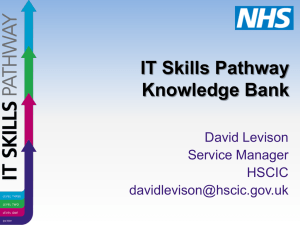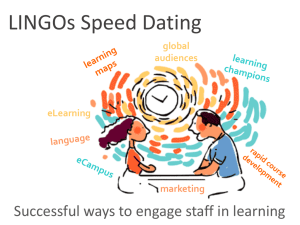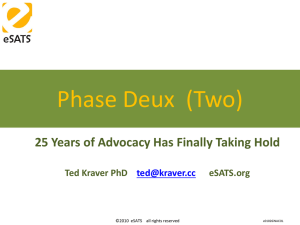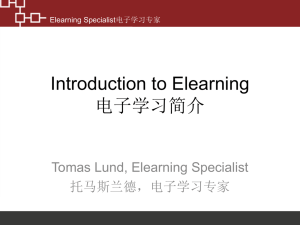Presentation
advertisement
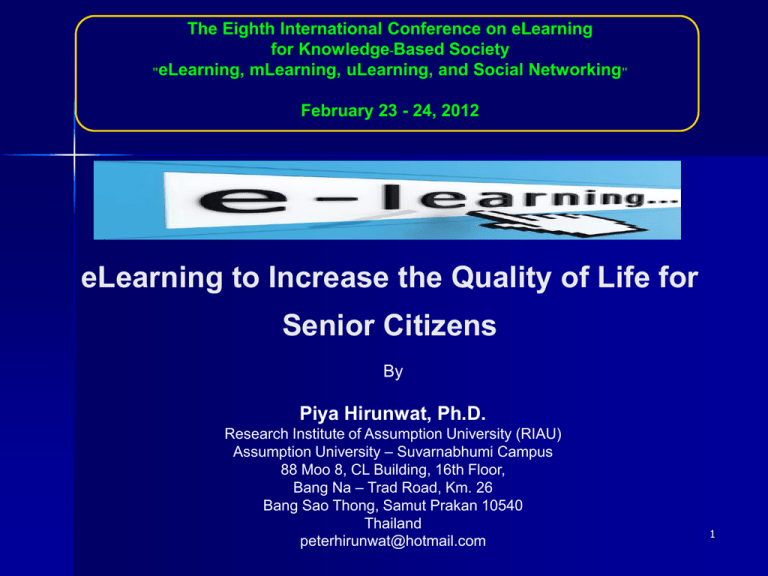
The Eighth International Conference on eLearning for Knowledge-Based Society "eLearning, mLearning, uLearning, and Social Networking" February 23 - 24, 2012 eLearning to Increase the Quality of Life for Senior Citizens By Piya Hirunwat, Ph.D. Research Institute of Assumption University (RIAU) Assumption University – Suvarnabhumi Campus 88 Moo 8, CL Building, 16th Floor, Bang Na – Trad Road, Km. 26 Bang Sao Thong, Samut Prakan 10540 Thailand peterhirunwat@hotmail.com 1 Introduction Beginning of Aging Population 1. Increasing aging population in many countries around the world. 2. Most significant increasing number of aging populations in developing countries, including Thailand. 2 Introduction Becoming of Aging Population in Thailand - In Thailand, the life expectation of females is greater than the life expectancy of males. - Many elders in Thai society have aging illness with physical limitation. - It is necessary to provide a good care for elders. - Thai government should support the elders in the society to have a good health according to 1. Senior care principles of the United Nations 2. Social and quality of life per the policy of the Ministry of 3 Public Health. Introduction Types of Seniors 1.) Healthy elders 2.) Elders suffering from illnesses 4 Needs of Research - In order to improve the quality of seniors’ life, eLearning helps transform the classical way of paper-based learning to electronic knowledge-based learning center. - This research was focused on eLearning of both healthy aging seniors and ones who suffer from aging illness. 5 Research Scope and Limitation - Mainly in Thailand - Elders in other countries (Borderless communication) 6 Benefits of Study - eLearning via the Internet or wireless communications has become significantly important in today’s society. - eLearning of new senior care knowledge greatly increases the quality of life for both healthy seniors to live happily, and the ones who suffer from aging illness to explore an affordable quality care and treatment. 7 Theories Related to the Study Transformation from Traditional Learning to eLearning Types of Learning Changes Changes Tradition Transition Transformation Motivation for Change Better, Faster, Cost-saving Solve a problem Survival, Environment & World changes, Breakthrough needed Degree of Change Incremental improvements Transition from old to new Revolutionary, Necessary Manage and control processes Design and implement the plan Whole system change Destination Limited to improving wrong things To complete project Continually transforming, No end state Change Required Improvement of skills, Practices and performance; often Limited to focusing on individual performance rather than whole system Controlled process Senior leadership committed to new thinking, learning and actions; Coaching from outside Improvements limited Changes limited Sustainable change (with leadership and continual learning of new action/system) Actions Outcomes 8 Literature Reviews A. Appreciative Inquiry (AI) of eLearning - Concept of building the organization of what works, rather than trying to fix what does not. - AI is focused on how to create more the exceptional performance occurring when the core strengths are aligned. It opens the doors to the new opportunities or possibilities. - AI has been used extensively to foster change in the health care systems. - Sharing what has changed, what is going to be better and/or what could do more to reach our desire future. All these factors help sustain a positive change. Main Reasons of AI Application - eLearning is more productive learning for seniors. - Elders can choose any knowledge topics that they want/need to learn the most as suitable as their learning skills. - Cost of eLearning is much lower than traditional way of learning i.e. traveling to attend a seminar, or cost of purchased hardcopy books. Additionally, they can learn anywhere and anytime that they want. - Outcomes of appreciative inquiry-based eLearning are more than expected of many new perspectives for senior care knowledge to choose from. - The best thing is that the eLearning supports the appreciative inquiry-based problem solving. In stead of disregarding those problems, they can learn and have a new vision of turning the current identified problems into challenges, the current identified strengths into sustainable competitive advantages or competencies, the current identified weaknesses and threats into new potential opportunities, and the current identified opportunities into new aspirations. 9 Literature Reviews B. Transformation - Transformation is the creation and change of a whole new form, function, or structure. - To transform is to create something new that has never existed before, and could not be predicted from the past. - Transformation is also a “change” in mindset that is based on learning a system of profound knowledge, and taking actions based on leading with knowledge and courage. - The critical reason of transformation for senior eLearning is that there are significantly increasing number of seniors in Thailand, and Thailand has become the aging society. Therefore, eLearning supports these changes. 1. Awakening 2. Vision Creation 3. Transformation Method 6. Intention 4. Learning of Profound Knowledge and Continued Learning 5. Integrated 10 Conceptual Framework Figure 4.1: Conceptual Framework of Senior eLearning Relationships Source: Vate-U-Lan, Poonsri, Ph.D. (2008), mLearning by Personal Digital Assistants (PDAs) 11 Conceptual Framework (Cont.) Three Types of Learning: 1.) Formal Learning (การศึกษาในระบบ) The formal learning is the actual formal academic curriculum, mostly in the classroom of education institutions. 2.) Non-formal Learning (การศึกษานอกระบบ) The non-formal learning is not-in-system education that is more flexible in terms of the study materials and academic curriculum adapted per needs, problems, and conditions of each individual. The learners are from outside of the education institutions. 3.) Informal Learning (การเรี ยนรู้ตามอัธยาศัย) The informal learning is the most flexible ways of learning by themselves outside the education facility, since each individual can learn by themselves at any time or anywhere they want to learn, and they can choose their preferred learning topics. 12 Conceptual Framework (Cont.) As shown in Figure 4.1, the seniors can choose many ways of their learning. The informal learning (การเรี ยนรู้ตามอัธยาศัย) is the best suitable one that they can learn about the topics of how to improve their physical body, mind, and soul/spirit related the total human society system as well as global system. 13 Conceptual Framework (Cont.) 1 2 3 1.) Distance Learning (dLearning) It is a learning from long distance. 2.) Electronic Learning (eLearning) It is a subset of dLearning by using electronic computing contents as a medium. 3.) Mobile Learning (mLearning) It is a subset eLearning and dLearning. It is also similar to eLearning, but the difference of mLearning is that the learners can learn from their personal portable devices (e.g. iPad, iPod, mobile phone) while they are travelling (e.g. on the bus or airplane), and they can choose to learn at anytime and anywhere they want. 14 Research Methodology Qualitative Methodology Mainly based on qualitative methodology of the eLearning studies of Poonsri Vate-U-Lan, Ph.D., a graduate level lecturer of Assumption University for College of Internet Distance Education. Quantitative Methodology The quantitative data was supported by focus group discussion with participatory action research primarily based on the study of “Elderly Volunteer’s Participation on Elderly Group for Health Promotion and Health Protection on Phra Nakhon Si Ayutthaya Province through Participatory Action Research” conducted by Phra Nakhon Si Ayutthaya Rajabhat University. 15 Research Findings - Electronic information technology in Thailand has been significantly improved for the last 13 years. - The Internet is a way of borderless communications for knowledge, and the new generations are utilizing the eLearning from their communication gadgets. - At the same time, the seniors have realized the usefulness of eLearning via new communication devices. The seniors can search for much helpful senior care knowledge to improve their quality of life and make them happy. 16 Research Findings (Cont.) Advance Technology, Lower Cost of New Gadgets With more advance technology and lower cost of new communication devices, the seniors can afford to purchase these new gadgets for their eLearning of senior care. E.g. Personal digital assistants (PDAs), Smart phones, iPods, iPads 17 Research Findings (Cont.) eLearning of Senior Care Knowledge eLearning helps seniors quickly access to the useful senior care information. They can learn about new products/supplies of senior care. E.g. Learning how to use the blood pressure unit or necessary medical equipment/supplies. Senior Care’s Quality of Life Improvement From the studies of many education institutions, the characteristics of eLearning are substantially different from the other ways of learning, since it has many hybrid modes as follows: 3.1 Enhancing eLearning motivates learning at anytime and anywhere, as well as promotes actual learning. The seniors can communicate to anyone at anytime. E.g. The seniors can contact their friends and relatives at anytime to discuss about senior care, and share their new knowledge via SMS, e-mail and social networking. 18 Research Findings (Cont.) 3.2 Exciting eLearning makes seniors more excited to learning about new things. Instead of learning by reading senior care paper articles, the seniors can learn much senior care knowledge from YouTube, the largest worldwide video-sharing community, on the Internet. 3.3 Engaging Once the seniors attract to learn and explore new knowledge, the seniors can subscribe to the senior community and access the community website at anywhere and anytime. The engagement of senior community leads to collaboration and appeal for further studies and productive research knowledge. 3.4 Enjoyable eLearning makes knowledge delight to learn. The regular learning is cut-anddried materials, but eLearning is more enjoyable with interactive multimedia features. 19 Research Findings (Cont.) 3.5 Entertaining Entertainment promotes and supports eLearning in many ways. 3.5.1 Senior care knowledge information combined with entertainment is called “Senior InfoTainment.” 3.5.2 Senior care training plus entertainment is known as “Senior Care EnterTraining.” 3.5.3 Senior care education and entertainment is the most well-known as “Senior EduTainment.” 3.5.4 The new concept of ethical senior care with entertainment is to be called “Senior EthicTainment.” 3.6 Embedding eLearning makes a convenient learning environment. E.g. The seniors who are working or having their own business operations can search and learn the new knowledge from eLearning, while working or taking care of their business operations. 3.7 Empowering eLearning empowers seniors to learn many useful knowledge. The seniors have their power to choose the knowledge topics that they are interested to learn. 20 Research Findings (Cont.) 3.8 Efficiency eLearning makes an effective learning of many useful knowledge. The seniors spend the same or less time to obtain more knowledge. Moreover, the cost of eLearning is less expensive than other ways of learning. 3.9 Explicit Contents eLearning makes learning with clear purpose and structure. The flexibility and customization of eLearning create the appropriate contents with understandable purpose and structure. 3.10 Extensibility eLearning expands the outcomes and changes/adapts according to the learners’ environment along with future new technology. The extension of eLearning is leading to the sustainable learning of knowledge-based society. 21 Research Findings (Cont.) Limitations of eLearning 1. eLearning depends on the communication gadgets. 2. The specifications of device such software or application are important to support the new features. 3. The new advance technology gadgets are normally expensive. 4. The cost of access either wired or wirelesses coupled with upgradable choices are to be considered. 22 Research Findings (Cont.) Recommendations 1. The eLearning of seniors using new advance information technology is one of the most important achievements on improving the quality of their life. 2. The further development and learning of information systems suitable for senior care industry is recommended. 3. The seniors should carefully explore, learn and choose ones with most appropriate or good to high quality. 4. The seniors should concern about the accuracy of data that can be reliable. 5. If there is any information related to the financial data of seniors, the data security is the most important concern. The seniors should be careful when providing their financial data to any third party. E.g. If they would like to subscribe an online database of senior care, they should make sure that the data are from good reputation and reliable sources, since there are plenty of information available on the Internet. 6. The senior care knowledge management center (KMC) can be developed with the electronic information technology via the Internet to provide the useful senior care knowledge for the family members and other interesting stakeholders in the society. It is critical to the health of elders in Thailand as well as global society on providing the high 23 quality senior care and knowledge-based center. References [1] Cooperrider, D. L. & Avital, M. (2004). Advances in Appreciative Inquiry Volume 1: Constructive Discourse and Human Organization, Oxford, United Kingdom: Elsevier Ltd. [2] Cummings, T. G. and Worley, C. G. (2005). Organization Development and Change (8th Edition), Ohio, U.S.A.: Thompson South-Western. [3] Daszko, Marcia and Sheinberg, Sheila, Ph.D. (2005). Survival Is Optional: Only Leaders with New Knowledge Can Lead the Transformation, Marcia Daszoko & Associates, California, U.S.A. [4] Lewenson, S. B. and Truglio-Londrigan, M. (2008). Decision-making in Nursing: Thoughtful Approaches for Practice, Massachusetts, U.S.A.: Jones and Bartlette Publishers. [5] O’Brien, James A. (2002). Management Information Systems: Managing Information Technology in the E-Business Enterprise (5th Edition), New York, U.S.A.: McGraw-Hill Higher Education. [6] Orem, S. L., Binkert, J. and Clancy A. L. (2007). Appreciative Coaching: A Positive Process for Change, California, U.S.A.: Jossey-Bass. [7] Threerapuncharoen, Noppawan, Assoc. Prof. (2011). Elderly Volunteer’s Participation on Elderly Group for Health Promotion and Health Protection on Phranakhon Si Ayutthaya Province Through Participatory Action Research, Phra Nakhon Si Ayutthaya, Thailand: Tienwattana Printing [8] Vate-U-Lan, Poonsri, Ph.D. (2008), mLearning by Personal Digital Assistant (PDAs), [Online]. Available: https://thaimlearning.blogspot.com/2008/07/blogpost.html?utm_source=feedburner&ut m_medium=feed&utm_campaign=Feed%3A+M-learningAndU-learning+%28eLearning+M-learning++and+U-learning+in+Thailand%29 24 Acknowledgement I would like to thank my parents for their inspiration of eLearning for seniors. The eLearning is one of the ways to improve the quality of life for senior care in the society. Additionally, Prof. Dr. Srisakdi Charmonman provided many useful suggestions about the importance of eLearning that would help Thai aging society and many in other countries around the world. 25 Questions & Answers 26 Thank You 27
